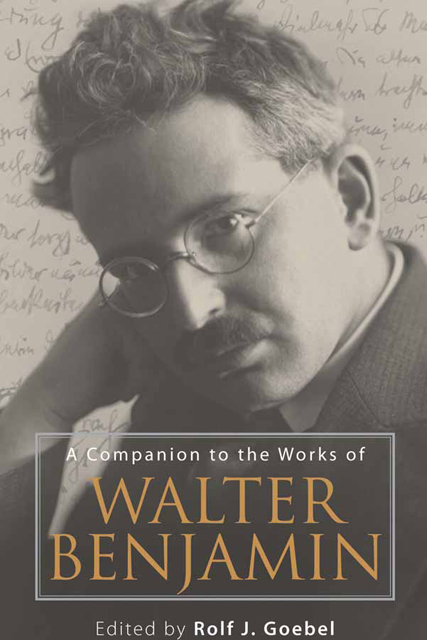Book contents
- Frontmatter
- Contents
- Preface
- Sources of Benjamin’s Works
- Chronology of Benjamin’s Major Works
- Introduction: Benjamin’s Actuality
- 1 Walter Benjamin's Criticism of Language and Literature
- 2 The Presence of the Baroque: Benjamin’s Ursprung des deutschen Trauerspiels in Contemporary Contexts
- 3 Lost Orders of the Day: Benjamin's Einbahnstraße
- 4 Literature as the Medium of Collective Memory: Reading Benjamin’s Einbahnstraße, “Der Erzähler,” and “Das Paris des Second Empire bei Baudelaire”
- 5 Benjamin in the Age of New Media
- 6 One Little Rule: On Benjamin, Autobiography, and Never Using the Word “I”
- 7 The Passagen-Werk Revisited: The Dialectics of Fragmentation and Reconfiguration in Urban Modernity
- 8 Benjamin’s Politics of Remembrance: A Reading of “Über den Begriff der Geschichte”
- 9 The Legacy of Benjamin’s Messianism: Giorgio Agamben and Other Contenders
- 10 Paris on the Amazon? Postcolonial Interrogations of Benjamin’s European Modernism
- 11 Benjamin’s Gender, Sex, and Eros
- 12 Sonic Dreamworlds: Benjamin, Adorno, and the Phantasmagoria of the Opera House
- Select Bibliography and List of Further Reading
- Notes on the Contributors
- Index
9 - The Legacy of Benjamin’s Messianism: Giorgio Agamben and Other Contenders
Published online by Cambridge University Press: 28 February 2023
- Frontmatter
- Contents
- Preface
- Sources of Benjamin’s Works
- Chronology of Benjamin’s Major Works
- Introduction: Benjamin’s Actuality
- 1 Walter Benjamin's Criticism of Language and Literature
- 2 The Presence of the Baroque: Benjamin’s Ursprung des deutschen Trauerspiels in Contemporary Contexts
- 3 Lost Orders of the Day: Benjamin's Einbahnstraße
- 4 Literature as the Medium of Collective Memory: Reading Benjamin’s Einbahnstraße, “Der Erzähler,” and “Das Paris des Second Empire bei Baudelaire”
- 5 Benjamin in the Age of New Media
- 6 One Little Rule: On Benjamin, Autobiography, and Never Using the Word “I”
- 7 The Passagen-Werk Revisited: The Dialectics of Fragmentation and Reconfiguration in Urban Modernity
- 8 Benjamin’s Politics of Remembrance: A Reading of “Über den Begriff der Geschichte”
- 9 The Legacy of Benjamin’s Messianism: Giorgio Agamben and Other Contenders
- 10 Paris on the Amazon? Postcolonial Interrogations of Benjamin’s European Modernism
- 11 Benjamin’s Gender, Sex, and Eros
- 12 Sonic Dreamworlds: Benjamin, Adorno, and the Phantasmagoria of the Opera House
- Select Bibliography and List of Further Reading
- Notes on the Contributors
- Index
Summary
IN THE OPENING LINES OF HIS SEMINAL ESSAY “Bewußtmachende oder rettende Kritik,” published in 1973 on the occasion of Benjamin's eightieth birthday, Jürgen Habermas locates the relevance of Benjamin's work in the conflicts it continues to raise among those who consider themselves close to his philosophical and political vision. Habermas recognizes a direct continuity between the battle lines defining the reception of Benjamin's writings since their publication in the fifties and sixties and the divergent political positions that had an impact on him in his lifetime. These positions were, for Habermas, embodied by Benjamin's friends Gershom Scholem, Theodor W. Adorno, and Bertolt Brecht and, to a lesser extent, by the school reformer Gustav Wyneken and the surrealist artists. Habermas assigns to each of these figures a set of heirs — among them Hannah Arendt, but also the rebellious students of 1968 — each taking up one of what can summarily be defined as the Jewish-mystical, the leftist modernist, the orthodox Marxist, the neoconservative, and the anarchic dimensions of Benjamin's legacy.
More than three decades, a millennial turn, and generations of Benjamin scholars later, the contemporary relevance of his work can still be assessed in terms of its power to generate disagreement, but the lineage is no longer as clear cut as in Habermas's scheme. The main controversies among the various figures summoned by Habermas focus on the question of whether theology or Marxism predominates in Benjamin's thinking. While the academic reception, which Habermas calls “a corrective” but “not an alternative,” and which has grown immeasurably since the publication of his article, generally turned away from these former debates to less contentious areas, the most original representatives among today's readers of Benjamin return to these early conflicts and probe the unresolved issues of yesterday's debates in the light of situations and problems of the present. Benjamin's messianism, the element of his work where theology and politics are most indissolubly intertwined, lies at the center of their attention.
Faced with urgent concerns at the turn of the twenty-first century — the fate and status of democracy, the embattled legacy of Marx and the renewed impact of religion in both the theoretical and political realms — Jacques Derrida and Giorgio Agamben turn to Benjamin's messianism in elaborating their own positions.
- Type
- Chapter
- Information
- A Companion to the Works of Walter Benjamin , pp. 195 - 215Publisher: Boydell & BrewerPrint publication year: 2009



